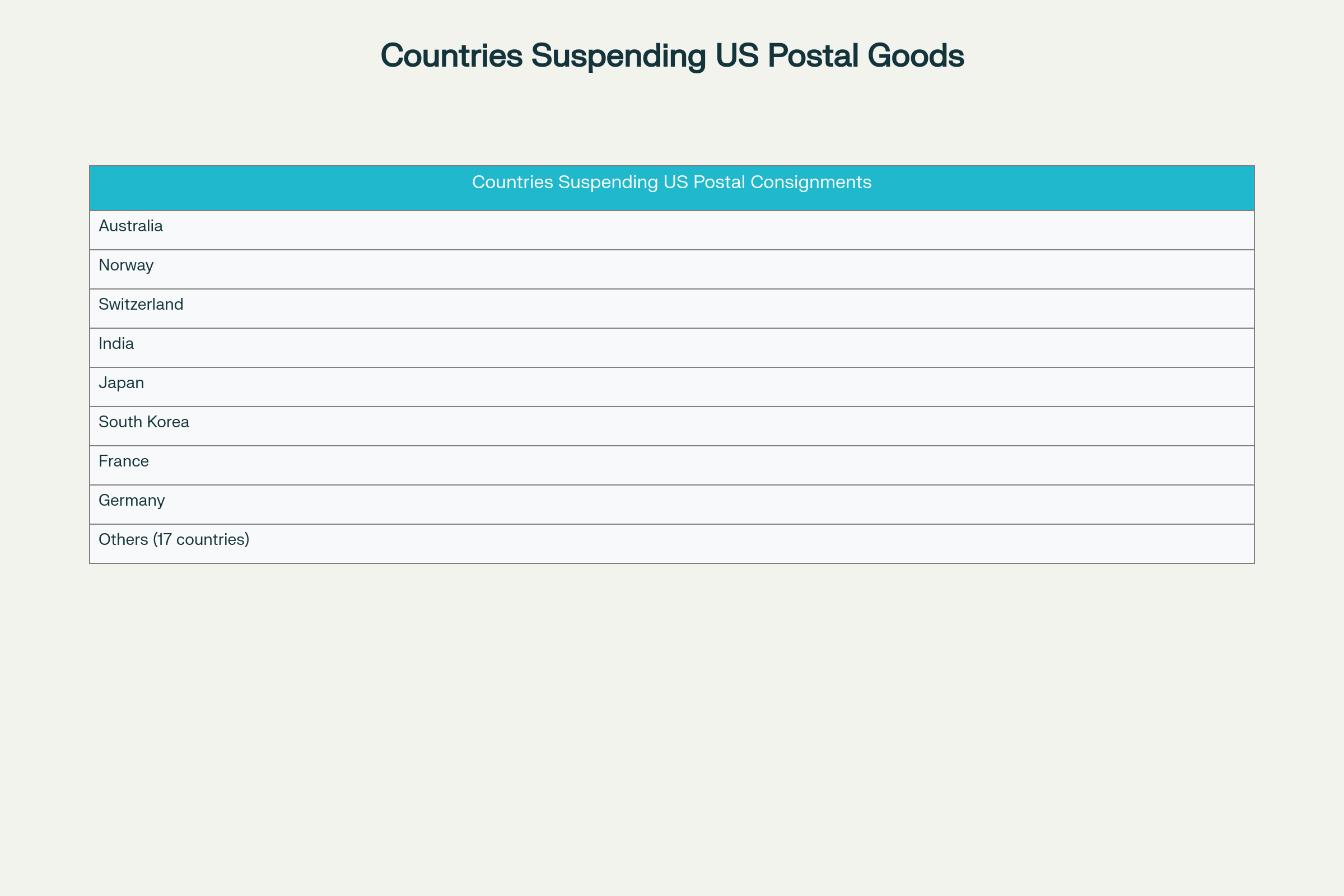Key Highlights
- 25 nations have temporarily suspended postal goods consignments to the United States, creating an unprecedented global postal crisis following Trump’s elimination of the de minimis duty exemption for packages under $800
- The Universal Postal Union has formally expressed concerns to Secretary of State Marco Rubio about the growing global postal crisis and its disruption to international postal systems
- Australia, India, Japan, South Korea, and several European countries are among major economies halting postal services as the global postal crisis deepens
Opening Overview
The world faces an unprecedented global postal crisis as 25 countries have suspended goods consignments to the United States, marking one of the most significant trade-related postal disruptions in recent history. This postal crisis stems directly from President Donald Trump’s administration eliminating the longstanding de minimis duty exemption, which previously allowed packages valued under $800 to enter the United States duty-free. The sweeping policy change has created operational uncertainty that prompted postal services worldwide to halt shipments, transforming what began as a trade policy adjustment into a full-scale global postal crisis.
The Universal Postal Union, the Switzerland-based international organization coordinating postal cooperation among 192 member countries, has formally conveyed concerns about this global postal crisis to U.S. Secretary of State Marco Rubio on August 25, 2025. The situation highlights the interconnected nature of international postal systems and demonstrates how unilateral trade policy changes can trigger a postal crisis affecting millions of consumers and small businesses who rely on affordable international postal services.
A #UN agency overseeing the postal sector said 25 of its member states have suspended shipments to the #US following the Trump administration’s decision to eliminate a customs tax rule that exempted small packages from duty.#Forbes
— Forbes Middle East (@Forbes_MENA_) August 26, 2025
For more details: 🔗 https://t.co/eE87IRPYgB pic.twitter.com/eWQq0whya7
Countries Leading the Suspension Wave
- Major economies including Australia, India, Japan, and several European Union members have announced immediate suspensions amid the expanding postal crisis
- The Universal Postal Union reports operational challenges in implementing new tariff collection mechanisms across different national postal systems during this postal crisis
The scale of the postal crisis extends across multiple continents, with prominent countries taking decisive action to protect their postal operators from compliance complications. Australia Post announced a temporary partial suspension of postal services to the United States and Puerto Rico, effective August 26, 2025, stating that the action was unavoidable as the global postal crisis deepened following the Trump administration’s elimination of duty-free regulations for low-value packages.
Japan Post similarly implemented a temporary halt on shipments of small packages valued over $100 to the United States, citing logistical difficulties and uncertainty surrounding new U.S. tariff regulations contributing to the global postal crisis.
India’s Department of Posts suspended all types of postal articles destined for the United States from August 25, 2025, except for letters, documents, and gift items valued up to $100, joining the growing list of countries affected by this global postal crisis. European postal services in Germany, Denmark, Sweden, Italy, and France have also stopped shipping most merchandise to the United States, reflecting the widespread international nature of this global postal crisis.
South Korea has ceased parcel shipments through its postal service, though customers can still utilize alternative shipping options through partnerships with private carriers like UPS during this global postal crisis. These coordinated suspensions demonstrate the serious operational challenges that the new tariff policy has created for international postal services worldwide.
De Minimis Exemption Elimination and New Tariff Structure
- The Trump administration’s executive order eliminates duty-free treatment for all shipments regardless of value, country of origin, or transportation method, intensifying the global postal crisis
- New tariff structures include ad valorem duties equal to effective tariff rates or flat charges ranging from $80 to $200 depending on the country’s existing tariff rate
The de minimis exemption, which has been a cornerstone of international e-commerce and postal services since its expansion in 2016, officially ends on August 29, 2025, marking a critical turning point in this global postal crisis. Under the previous system, the de minimis exemption allowed shipments valued at $800 or less to enter the United States without incurring duties and with minimal paperwork requirements, facilitating billions of dollars in small-value international trade before the current global postal crisis emerged.
The Trump administration’s executive order, signed on July 30, 2025, declares that duty-free de minimis exemption treatment shall no longer apply to any shipment regardless of value, country of origin, mode of transportation, or method of entry, effectively triggering this global postal crisis. The new tariff structure presents postal operators with complex compliance requirements that have become central to the ongoing global postal crisis, as packages must now face either ad valorem duties equal to the effective tariff rate of the package’s country of origin, or alternatively, a flat charge ranging from $80 to $200 depending on the country’s existing tariff rate for a six-month transition period.
These tariff changes particularly impact countries with higher baseline tariff rates during this global postal crisis, such as China, Brazil, India, Switzerland, and Canada, where an $800 item from a nation with a 25% tariff rate could incur at least an additional $200 in costs upon entry to the United States. The de minimis exemption elimination affects the processing of 309 million shipments recorded through June 30, 2025, compared to 115 million shipments for the entire previous fiscal year, demonstrating the substantial volume of international commerce now subject to new tariff requirements amid this global postal crisis.
Operational Challenges and Industry Response
- Private carriers like FedEx continue normal operations as express carriers remain largely unaffected by the postal operator decisions during this global postal crisis
- Postal services cite undefined critical processes relating to qualified party designation and duty collection mechanisms as primary concerns in the global postal crisis
The suspension of postal services reflects deeper operational complexities that postal operators face in adapting to the new tariff collection requirements during this global postal crisis. India’s communications ministry highlighted that the executive order requires transport carriers or other qualified parties approved by U.S. authorities to collect and remit tariff duties, but several critical processes relating to the designation of qualified parties and mechanisms for duty collection and remittance remain undefined, contributing to the uncertainty of this global postal crisis.
U.S.-bound air carriers have expressed their inability to accept postal consignments after August 25, 2025, citing lack of operational and technical readiness to handle the new compliance requirements created by this global postal crisis. This operational gap has forced postal services to suspend shipments until clarity emerges regarding implementation procedures and approved collection mechanisms, prolonging the global postal crisis. In contrast, private express carriers like FedEx have emphasized their continued normal operations during this global postal crisis, with FedEx Regional Vice President Peter Langley stating that as an express carrier, their international express offerings are not impacted by decisions of postal operators.
The distinction between postal and private carrier operations highlights how the policy change disproportionately affects government postal services during this global postal crisis, as they lack the sophisticated customs processing infrastructure of major private logistics companies. Some countries have maintained limited shipping options through partnerships with private carriers, as demonstrated by South Korea’s continued service through UPS arrangements despite suspending postal service shipments amid the global postal crisis.

Economic Impact and Consumer Implications
- Small businesses and e-commerce operations face significant cost increases and shipping delays that could force operational shutdowns as the global postal crisis deepens
- The policy aims to support domestic manufacturing but creates immediate disruptions to established supply chains and consumer access during this global postal crisis
The elimination of the de minimis exemption creates substantial economic implications for both consumers and small businesses that have relied on affordable international postal services before the global postal crisis emerged. Many small entrepreneurs have taken to social media platforms expressing concerns that shipping cost increases may force them to shut down their operations entirely, particularly those dependent on low-value international goods sourcing that previously benefited from streamlined postal processing before this global postal crisis.
The Trump administration justifies these measures by arguing that the de minimis exemption facilitates deceptive shipping practices, duty evasion, and illegal shipments including fentanyl trafficking, while also supporting the goal of protecting domestic manufacturing, despite the resulting global postal crisis. However, the immediate implementation has created what Investopedia Editor-in-Chief Caleb Silver describes as significant confusion about tariff collection mechanisms during this global postal crisis, questioning who will collect duties, what fees will be extracted from these collections, and how this adds complexity to an already confusing tariff system.
The policy’s impact extends beyond simple cost increases, as the suspension of postal services forces consumers and businesses to seek alternative shipping methods that often come with substantially higher costs and longer delivery times during this global postal crisis. The disruption particularly affects small-value transactions that previously benefited from streamlined postal processing, creating barriers for international small business trade and consumer access to affordable foreign goods as the global postal crisis continues.
Final Perspective
The suspension of postal goods consignments by 25 countries represents a significant diplomatic and economic challenge that extends far beyond trade policy into international cooperation and consumer welfare, defining this global postal crisis as more than just a logistics issue. The Universal Postal Union’s formal communication with Secretary of State Marco Rubio underscores the international nature of this global postal crisis and the urgent need for operational clarity to restore normal postal functions. As postal services worldwide await definitive guidance on implementation procedures and qualified party designations, millions of consumers and small businesses face continued uncertainty about international shipping options and costs throughout this ongoing global postal crisis.
The situation demonstrates how unilateral trade policy changes can create cascading effects across international systems, highlighting the delicate balance between protectionist economic goals and maintaining functional global commerce networks during a global postal crisis. The resolution of this global postal crisis will likely require substantial coordination between U.S. customs authorities, international postal services, and private carriers to establish workable compliance mechanisms that address both security concerns and operational practicality in the global postal system.


